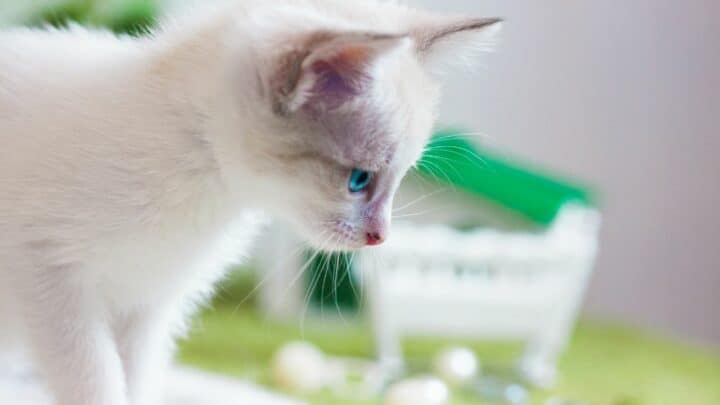The phrase “Cat’s in the cradle” is most popularly used in reference to Harry Chapin’s 1974 song of the same name.
The song is about a father and son’s broken relationship, and is popularly interpreted as a warning against not investing enough time in one’s family.
The song’s chorus references a series of children’s stories. The implication that the boy’s father could never find the time to read them to him.
The song is about a father’s neglect for his son and is now often seen as a reference to broken commitments and the dangers of parental absence.
What is the meaning of the expression “Cat’s in the cradle”?
If someone says that the “cat’s in the cradle” with two people, they mean that something is disrupting their relationship. The phrase “Cat’s in the cradle” is often used to refer to situations in which one person has neglected another, or there is a total breakdown of communication.
The origins of the phrase “Cat’s in the cradle”
It is all well and good to know what the idiomatic phrase “Cat’s in the cradle” means and to know how to use it in a sentence.
However, it may still seem like a somewhat nonsensical expression to most of us.
To understand why it is that someone might say, “the cat’s in the cradle with my mom and my sister” to mean that their mother and sister do not speak to each other, we need to dig a little deeper.
First and foremost, we have to examine why Harry Chapin used this expression the way he did.
The chorus of Chapin’s 1974 song reels of a series of children’s songs. The lyric is, “The cat’s in the cradle and the silver spoon/ little boy blue and the man in the moon.”
“The Man in the Moon” and “Little Boy Blue” are both nursery rhymes. Many people believe the “Cat’s in the cradle” refers to the Dutch fairytale “The Cat and the Cradle.”
If fairy tales are your thing, please also have a look at our article on “Fee Fi Fo Fum.”
The implication here would be that these are stories the father in the song was too busy to read to his son.
However, “Cat’s in the cradle” might also be referring to the popular string game played by children, known as cat’s cradle.
The game cat’s cradle involves creating a “cradle” of sorts out of string using one’s fingers, and then passing it to another person.
It involves give-and-take between two people and mutual trust. If there is no trust, the “cradle” will collapse.
This is a metaphor for a relationship. There must be mutual trust and a mutual give-and-take, otherwise the cradle cannot hold up. This is of course the case with the father and son in Chapin’s song.
But there is even more than this to the phrase “Cat’s in the cradle.”
Chapin was likely also referencing the old wives’ tale that, if babies are neglected, cats climb into their cradles and kill them by sucking their breath away.
This odd and morbid urban legend seems to have its roots in a real-life case that took place in Plymouth, England in 1791.
The case involved the death of a baby in its cradle, and the jury found that the cause of death was suffocation by a cat.
In 1921, a doctor in Nebraska witnessed “the family pet in the act of sucking a child’s breath.” This story contributed to the myth’s spreading.
It has since been shown that any deaths thought to have been caused by evil, breath-sucking cats, were likely cause by Sudden Infant Death Syndrome (SIDS).
In the song “Cat’s in the cradle,” Chapin is making a point about the perils of neglect, and what happens when a parent is not there to put their child to bed and read them stories.
Even if the child is not likely to be smothered by an actual cat, a parent’s neglect can cause the relationship between parent and child to be metaphorically smothered.
How to use the phrase “Cat’s in the cradle”
Today, the phrase “Cat’s in the cradle” is used to describe situations in which a relationship has been fractured. It is frequently used when there has been neglect of one person by another.
However, it can also be used to describe any situation in which two people struggle to get along with each other.
The phrase “Cat’s in the cradle” is usually used to describe a broken parent-child relationship, but it can also be used to describe other kinds of fractured family relationships, or even unhappy romantic relationships.
John: Can we please talk?
Alex: Why? To speak with you is basically to dance with the devil. Even though I want to spend time with you, I always end up getting hurt.
John: I’m sorry if you feel that way. I just feel like the cat’s in the cradle with us and I want to resolve things.
Hermia: You keep cancelling our dates!
Lysander: Do I? Look, it is how it is. I don’t mean to, I’m just super busy.
Hermia: I just feel like the cat’s in the cradle with us recently.

Hey fellow Linguaholics! It’s me, Marcel. I am the proud owner of linguaholic.com. Languages have always been my passion and I have studied Linguistics, Computational Linguistics and Sinology at the University of Zurich. It is my utmost pleasure to share with all of you guys what I know about languages and linguistics in general.

